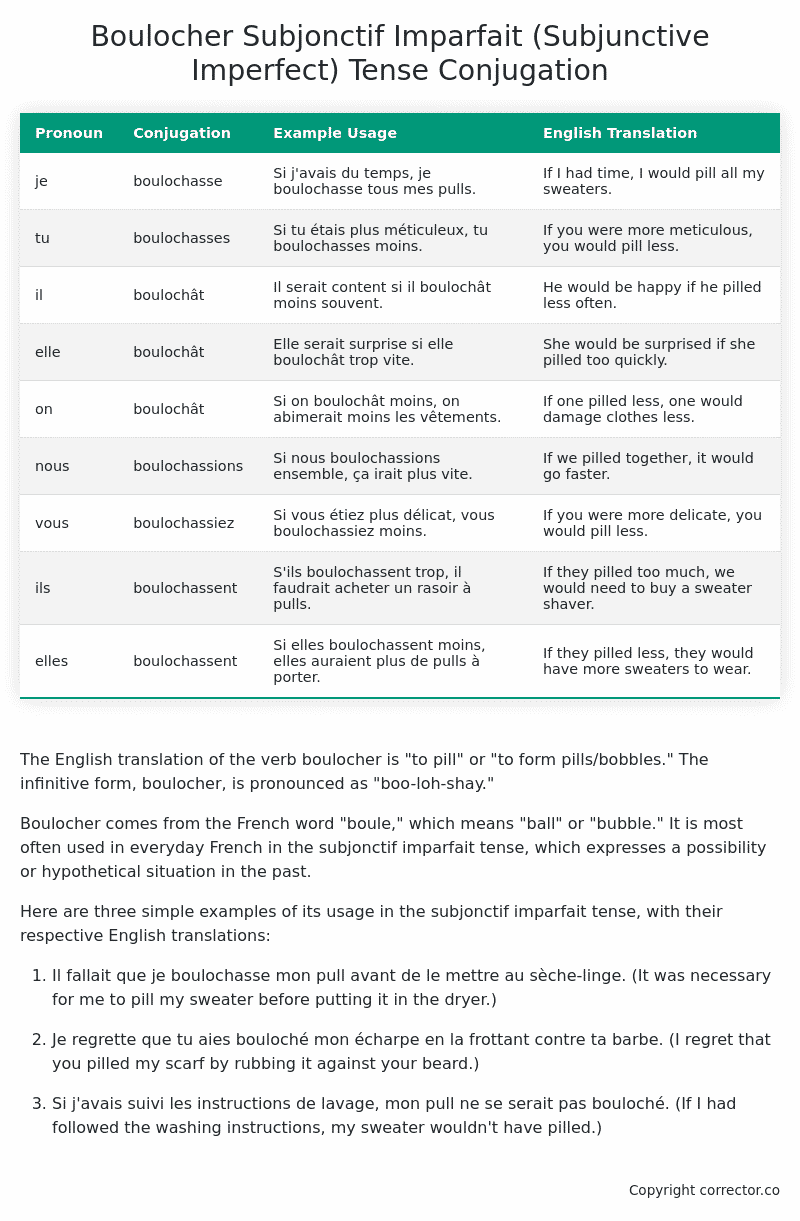Subjonctif Imparfait (Subjunctive Imperfect) Tense Conjugation of the French Verb boulocher
Introduction to the verb boulocher
The English translation of the verb boulocher is “to pill” or “to form pills/bobbles.” The infinitive form, boulocher, is pronounced as “boo-loh-shay.”
Boulocher comes from the French word “boule,” which means “ball” or “bubble.” It is most often used in everyday French in the subjonctif imparfait tense, which expresses a possibility or hypothetical situation in the past.
Here are three simple examples of its usage in the subjonctif imparfait tense, with their respective English translations:
-
Il fallait que je boulochasse mon pull avant de le mettre au sèche-linge. (It was necessary for me to pill my sweater before putting it in the dryer.)
-
Je regrette que tu aies bouloché mon écharpe en la frottant contre ta barbe. (I regret that you pilled my scarf by rubbing it against your beard.)
-
Si j’avais suivi les instructions de lavage, mon pull ne se serait pas bouloché. (If I had followed the washing instructions, my sweater wouldn’t have pilled.)
Table of the Subjonctif Imparfait (Subjunctive Imperfect) Tense Conjugation of boulocher
| Pronoun | Conjugation | Example Usage | English Translation |
|---|---|---|---|
| je | boulochasse | Si j’avais du temps, je boulochasse tous mes pulls. | If I had time, I would pill all my sweaters. |
| tu | boulochasses | Si tu étais plus méticuleux, tu boulochasses moins. | If you were more meticulous, you would pill less. |
| il | boulochât | Il serait content si il boulochât moins souvent. | He would be happy if he pilled less often. |
| elle | boulochât | Elle serait surprise si elle boulochât trop vite. | She would be surprised if she pilled too quickly. |
| on | boulochât | Si on boulochât moins, on abimerait moins les vêtements. | If one pilled less, one would damage clothes less. |
| nous | boulochassions | Si nous boulochassions ensemble, ça irait plus vite. | If we pilled together, it would go faster. |
| vous | boulochassiez | Si vous étiez plus délicat, vous boulochassiez moins. | If you were more delicate, you would pill less. |
| ils | boulochassent | S’ils boulochassent trop, il faudrait acheter un rasoir à pulls. | If they pilled too much, we would need to buy a sweater shaver. |
| elles | boulochassent | Si elles boulochassent moins, elles auraient plus de pulls à porter. | If they pilled less, they would have more sweaters to wear. |
Other Conjugations for Boulocher.
Le Present (Present Tense) Conjugation of the French Verb boulocher
Imparfait (Imperfect) Tense Conjugation of the French Verb boulocher
Passé Simple (Simple Past) Tense Conjugation of the French Verb boulocher
Passé Composé (Present Perfect) Tense Conjugation of the French Verb boulocher
Futur Simple (Simple Future) Tense Conjugation of the French Verb boulocher
Futur Proche (Near Future) Tense Conjugation of the French Verb boulocher
Plus-que-parfait (Pluperfect) Tense Conjugation of the French Verb boulocher
Passé Antérieur (Past Anterior) Tense Conjugation of the French Verb boulocher
Futur Antérieur (Future Anterior) Tense Conjugation of the French Verb boulocher
Subjonctif Présent (Subjunctive Present) Tense Conjugation of the French Verb boulocher
Subjonctif Passé (Subjunctive Past) Tense Conjugation of the French Verb boulocher
Subjonctif Imparfait (Subjunctive Imperfect) Tense Conjugation of the French Verb boulocher (this article)
Subjonctif Plus-que-parfait (Subjunctive Pluperfect) Tense Conjugation of the French Verb boulocher
Conditionnel Présent (Conditional Present) Tense Conjugation of the French Verb boulocher
Conditionnel Passé (Conditional Past) Tense Conjugation of the French Verb boulocher
L’impératif Présent (Imperative Present) Tense Conjugation of the French Verb boulocher
L’infinitif Présent (Infinitive Present) Tense Conjugation of the French Verb boulocher
Struggling with French verbs or the language in general? Why not use our free French Grammar Checker – no registration required!
Get a FREE Download Study Sheet of this Conjugation 🔥
Simply right click the image below, click “save image” and get your free reference for the boulocher Subjonctif Imparfait tense conjugation!

Boulocher – About the French Subjonctif Imparfait (Subjunctive Imperfect) Tense
Formation
Common Everyday Usage Patterns
Interactions with Other Tenses
Subjonctif Présent
Indicatif Passé Composé
Conditional
Conditional Perfect
Summary
I hope you enjoyed this article on the verb boulocher. Still in a learning mood? Check out another TOTALLY random French verb conjugation!


